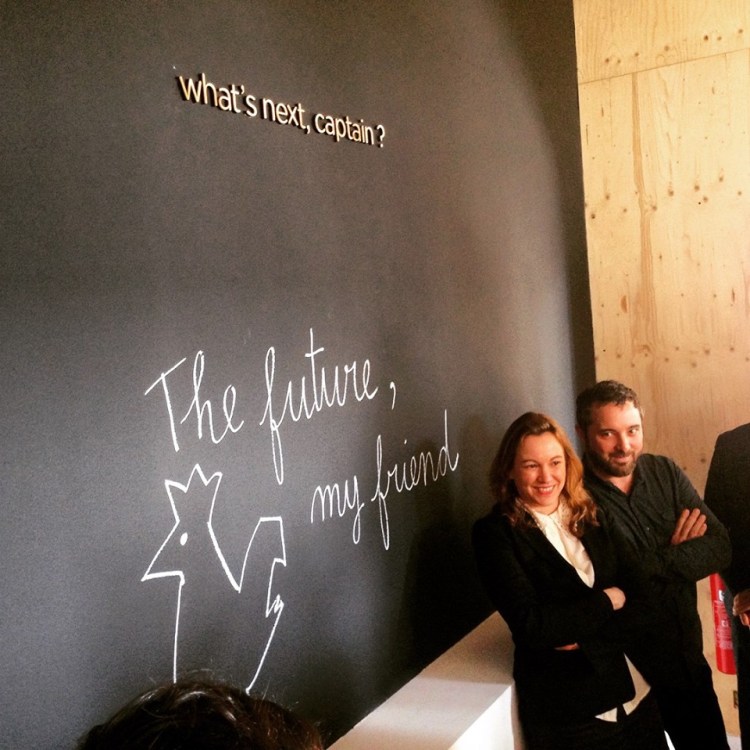TOULOUSE, France – French digital minister Axelle Lemaire arrived in this southwestern city today with plenty of good news to celebrate.
She began her visit to France’s fourth largest city in the morning by stopping at La Cantine, a startup incubator that showed off a dozen of the city’s emerging tech companies as local officials and press ate croissants and sipped coffee.
Then she drove a few blocks away for the official unveiling of the “Grand Builder by Ekito,” the new and much larger headquarters for Ekito, the startup accelerator that has been around for almost a decade. Pausing in front of a board that says “what’s next captain?” France’s deputy minister for digital affairs drew a picture of the rooster that is the French tech economy’s mascot and wrote her playful answer: “The future, my friend.”
For lunch, she travelled a few miles down the road to the headquarters for Sigfox, the Internet of Things startup that announced earlier this week it had raised $115 million, the largest round of venture capital in French history.
Yet for all these victories, and all the attempts to let everyone know that the country is ready to embrace disruption and innovation, Lemaire knows she still has a long way to go to change the world’s opinion about France’s tech economy. The notions that entrepreneurs are fleeing, that the country is a hard place to start a company, that the French simply lack the entrepreneurial spirit are hard ones to shake.
“I think it’s important to try to break some clichés about the country,” Lemaire said in an interview with VentureBeat. “This country has everything it needs to succeed, especially on the tech scene.”
La French Tech push
The centerpiece of the French government’s strategy to change the country’s reputation is a program overseen by Lemaire called “La French Tech.” Last year, France awarded nine cities the label “French Tech” in recognition of either their robust startup ecosystems or the support of local governments for creating favorable conditions for new tech companies. After a spirited local campaign, Toulouse was one of the nine winners selected.
There has been some criticism that the French Tech program, started under Lemaire’s predecessor, was an empty marketing ploy. But Lemaire says that the program is just a start, an attempt to create an identity and awareness of the widespread startup activity across France that wasn’t getting much recognition or respect.
Lemaire said that rather than create more startups initially, the idea was to help reveal the ones already there, an idea she compares to developing a photograph.
“There is an increased consciousness on the part of local authorities and the people in government that they are there, that these startups are not hidden any more,” she said. “Which is why I talk about a revelation. The government is doing really a lot of work to help support and promote those ecosystems.”
In addition, the French Tech program is intended to get the country’s startup regions, especially those outside Paris, to start working together.
As part of those promotional efforts, Lemaire and her boss, Economic Minister Emmanuel Macron, traveled to Las Vegas in January for CES 2015. The government staged a big publicity campaign to highlight the country’s 66 startups at CES, second only to the U.S. and more than any other country in Europe.
Lemaire said the government is trying to use such moments to reach out and persuade venture capitalists to take a deeper look at France.
Quest for international interest
“The people who are difficult to convince are the VCs,” she said. “They still automatically think of London, sometimes Berlin and Stockholm. And then sometimes Paris. But they wouldn’t even imagine coming to Toulouse. For them, Toulouse is a nice place to go on holiday. They don’t realize they could combine business and pleasure here.”
To draw the attention of venture capitalists, Lemaire has been holding monthly sessions in Paris where startups can pitch various government ministries. She invites VCs to show them not just the quality of French startups, but also the diversity: med tech, IoT, software, e-commerce. And she said the French government is in the early stages of planning a large, international tech event to draw investors from around the world to France.
In the meantime, the French government also trying to put some money in these ecosystems. Back in December, the government announced a $250 million fund for startup incubators.
Of course, having a company several hours outside Paris raise $115 million is also a good way to get the world’s attention. Lemaire hopes that such news spreads the message that the government has made a number of changes legally, financially, and socially to reinforce the notion that it believes strongly that startups and innovation are key to France’s economic future.
“It is great to do business in France at the moment,” she said. “Many people will tell you it’s the best moment ever to be an entrepreneur in France.
“Our message to the world is basically to say, ‘You’re welcome here.’ And to say, ‘How can we help you?'”
VentureBeat's mission is to be a digital town square for technical decision-makers to gain knowledge about transformative enterprise technology and transact. Learn More

